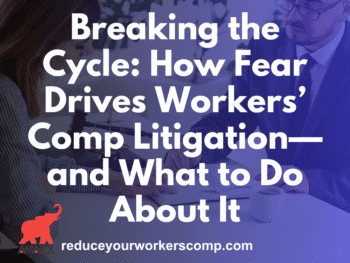With the economy either in a recession or in a very slow recovery, have you wondered what would happen to the worker’s compensation claims against your company if your company was forced to file for bankruptcy?
The answer depends on whether your company provides for workers’ compensation by purchasing an insurance policy or by self-insuring. If your company covers its worker’s compensation exposure by purchasing an insurance policy, the bankruptcy of your company will have a limited impact on your worker’s comp claims. The responsibility for those claims remains with your worker’s comp insurer.
Click Link to Access Free PDF Download
“How To Avoid, Manage, And Win Workers’ Comp Claim Litigation”
However, if you cover your workers compensation claims through a program of self-insurance then the relationship between bankruptcy and workers compensation becomes much more complex. If an employer files for Chapter 7 bankruptcy, the employer will be liquidated and the self-insurance program ends. (There is no further need for the workers comp insurance as the employees are all terminated).
Under a Chapter 7 bankruptcy, (in the states adopting the federal Bankruptcy Code — some states have not adopted it) workers comp claims are treated the same as wages owed to former employees. The workers comp claims are considered as unsecured creditors against the employer and are not given any priority over creditors.
Under a Chapter 11 bankruptcy, the self-insured employer has two choices. The first choice is to assume its existing self-insurance status, with the bankruptcy court approval. The employer continues to pay both new workers comp claims and claims filed prior to the bankruptcy filing.
The second choice has a totally different outcome for the employee’s and their workers comp claims. If the employer’s self-insured claims are sizable and will be a burden to the employer or a hindrance in returning the company to profitability, the employer may elect to end its self-insured status and purchase workers comp insurance for workers comp claims occurring after the bankruptcy filing. Under the option of ending the self-insured program, the workers comp claims are treated as unsecured creditors against the employer and are not given any priority over creditors.
If it sounds like the employees are out of luck when the self-insured employer files for a Chapter 7 bankruptcy, or ends its self-insured program as a part of the reorganization under a Chapter 11 bankruptcy, that’s not quite the case. Most states have a special fund, usually called a Guaranty Fund, in which the insurance carriers and the self-insured companies paid either an annual assessment or a surcharge against their workers comp book of business.
The Guaranty Fund is normally set-up for the sole purpose of administering the claims of an insurer or a self-insured company who goes bankrupt. When a self-insured becomes insolvent, the funds in the Guaranty Fund are used to pay the workers compensation benefits. These benefits are only available to the employees who workers comp claim prior to the employer’s bankruptcy filing and the self-insurance program has been terminated. Any workers comp claims occurring after the filing of Chapter 11 bankruptcy reorganization would be paid by the new insurer.
Depending on the jurisdiction where the bankruptcy occurs, the Guaranty Fund may require the employee to file a claim in the bankruptcy court as a creditor of the employer. Any proceeds received by the employee for their workers comp claim from the liquidation of the employer are considered an offset against the benefits that would be paid by the Guaranty Fund.
In summary, if the employer files a Chapter 11 bankruptcy and obtains the bankruptcy court’s permission to continue the self-insurance program, the bankruptcy has little impact on the workers comp claims. If the employer files a Chapter 7 bankruptcy or files a Chapter 11 bankruptcy and elects to end the self-insurance program, the workers comp claims become the liability of the Guaranty Fund.
Please do an internet search for a case study of the bankruptcy of the Johns Manville Corporation to see how workers comp claims alone can bankrupt a company.
The information in this blog is general in nature and is not meant to provide legal advice or guidance. If you have questions, please consult with your legal counsel in regards to the bankruptcy laws and workers compensation in your state or jurisdiction.
Author Rebecca Shafer, JD, President of Amaxx Risks Solutions, Inc. is a national expert in the field of workers compensation. She is a writer, speaker and website publisher. Her expertise is working with employers to reduce workers compensation costs, and her clients include airlines, healthcare, printing/publishing, pharmaceuticals, retail, hospitality and manufacturing.
Contact: RShafer@ReduceYourWorkersComp.com or 860-553-6604.
FREE TOOLS
WORK COMP CALCULATOR: http://www.LowerWC.com/calculator.php
MODIFIED DUTY CALCULATOR: http://www.LowerWC.com/transitional-duty-cost-calculator.php
JOIN OUR CONVERSATION
WC LINKEDIN GROUP: http://www.linkedin.com/groups?homeNewMember=&gid=1922050/
SUBSCRIBE: Workers Comp Resource Center Newsletter
Do not use this information without independent verification. All state laws vary. You should consult with your insurance broker or agent about workers comp issues.



























